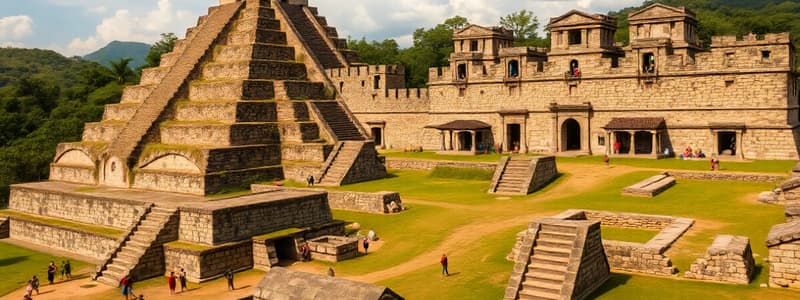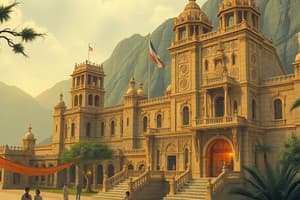Podcast
Questions and Answers
If the Inca Empire needed to quickly mobilize resources to address a famine in a distant province, which system would be most crucial for coordinating the response?
If the Inca Empire needed to quickly mobilize resources to address a famine in a distant province, which system would be most crucial for coordinating the response?
- The Quipu system for accurately assessing resource needs.
- The Ayllu system for redistributing local resources.
- The terrace farming techniques to increase food production.
- The Chaski system for rapid communication and relay of instructions. (correct)
Considering the Inca's polytheistic religion and reverence for the Sapa Inca, what was the likely justification for Pachacuti's expansionist policies starting in 1438?
Considering the Inca's polytheistic religion and reverence for the Sapa Inca, what was the likely justification for Pachacuti's expansionist policies starting in 1438?
- A divine right to expand the empire and bring more people under Inca control. (correct)
- A mandate to secure resources to alleviate internal economic struggles.
- A desire to spread monotheistic beliefs and eradicate rival religions.
- A need to establish trade routes with neighboring civilizations beyond the Andes.
How did the Inca road system affect the fall of the Inca empire in 1572?
How did the Inca road system affect the fall of the Inca empire in 1572?
- Provided refuge for the Inca to escape the Spanish.
- Had no impact on the fall since the road system was abandoned.
- Limited the Spanish conquest because the road system was only useful for natives.
- Facilitated the Spanish conquest by enabling the rapid movement of conquistadors and supplies. (correct)
If an Inca administrator needed to organize a labor draft for a large-scale irrigation project, which aspects of Inca society would need to be considered?
If an Inca administrator needed to organize a labor draft for a large-scale irrigation project, which aspects of Inca society would need to be considered?
Considering the diverse uses of aqueducts by the Inca, which of the following best explains their overall impact on Inca society?
Considering the diverse uses of aqueducts by the Inca, which of the following best explains their overall impact on Inca society?
If the Inca civilization had to adapt to a prolonged drought, which societal element would be most critical for ensuring food distribution and preventing widespread famine?
If the Inca civilization had to adapt to a prolonged drought, which societal element would be most critical for ensuring food distribution and preventing widespread famine?
Considering the Inca's use of the Quipu, which scenario would demonstrate its most effective application beyond basic record-keeping?
Considering the Inca's use of the Quipu, which scenario would demonstrate its most effective application beyond basic record-keeping?
Given the Inca's societal structure centered around Ayllus, how might a new ruler leverage this system to consolidate power and ensure loyalty across the empire?
Given the Inca's societal structure centered around Ayllus, how might a new ruler leverage this system to consolidate power and ensure loyalty across the empire?
Considering the geographical location of the Inca Empire, what challenge did the Amazon Rainforest present for expansion and how did this impact the empire's overall development?
Considering the geographical location of the Inca Empire, what challenge did the Amazon Rainforest present for expansion and how did this impact the empire's overall development?
If the Spanish conquistadors aimed to disrupt Inca communication and governance, which strategy targeting the Inca infrastructure would be most effective?
If the Spanish conquistadors aimed to disrupt Inca communication and governance, which strategy targeting the Inca infrastructure would be most effective?
Flashcards
Who were the Chaskis?
Who were the Chaskis?
Messengers who delivered information across the Inca Empire.
Inca agricultural innovation?
Inca agricultural innovation?
Terraces built on mountain slopes to create farmland.
Significance of Cusco?
Significance of Cusco?
The capital and heart of the Inca Empire.
Inca religion?
Inca religion?
Signup and view all the flashcards
What is an Ayllu?
What is an Ayllu?
Signup and view all the flashcards
What was the Quipu?
What was the Quipu?
Signup and view all the flashcards
Inca Road System Length
Inca Road System Length
Signup and view all the flashcards
Significance of 1438
Significance of 1438
Signup and view all the flashcards
Aqueduct Additional Use
Aqueduct Additional Use
Signup and view all the flashcards
End of Inca Resistance
End of Inca Resistance
Signup and view all the flashcards
Study Notes
- The Chaskis' primary role was message delivery across the Inca Empire's vast distances
- Incas enhanced agriculture by constructing terraces on mountain slopes
- Cusco was the Inca Empire's capital and central hub
- The Inca religion was polytheistic, with the Sapa Inca considered divine
- Quipu were used for record-keeping, as well as accounting and census data
- Ayllu refers to a family clan or extended kin group in Inca society
- The Inca Road System spanned over 24,000 miles
- In 1438 Pachacuti significantly expanded the Inca Empire
- Aqueducts were used for irrigation and water transportation
- The final Inca resistance ended in 1572
- Francisco Pizarro, the Spanish conquistador, arrived in 1532
- Intihuatana is the name of the Inca stone Sun Calendar
- The Amazon Rainforest bordered the eastern part of the Inca Empire
Studying That Suits You
Use AI to generate personalized quizzes and flashcards to suit your learning preferences.




